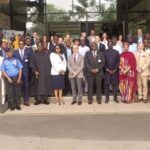By Oluwafunke Ishola
The Chief Medical Director, Lagos State University Teaching Hospital (LASUTH), Prof. Adetokunbo Fabamwo, has called for strong political will to prioritise adequate resource allocation to maternal and child health.
Fabamwo said this on Wednesday during the 24th Biennial Conference and Investiture Ceremony of the Medical Women’s Association of Nigeria, Lagos Branch.
The News Agency of Nigeria (NAN) reports that the event has the theme, “Road Map to Strengthening Healthcare Services for Women and Children: Policies, Politics, and Participation.”

Fabamwo noted that in spite of the past progress recorded in women’s, children’s and adolescents’ health, preventable death and burden of ill health still remain among these vulnerable populations, especially in rural communities.
Fabamwo, represented by Prof. Yusuf Oshodi, an Obstetrician and Gynaecologist at LASUTH, said healthcare of women and children constitutes about 70 per cent of the total healthcare needs globally.
“The issue of higher maternal mortality still persists.
“In 2017, there were about 295 million women who died from preventable causes related to pregnancy and childbirth, which also indicates an urgent need to address them.
“Concerning neonatal and child mortality, 2.6 million babies are born as stillbirths, another 2.5 million will die within one month of life, and five million children under five will also die, which highlights critical health needs for these children,” he said.
He noted that women deserve focused medical support during pregnancy and childbirth to ensure that the mother and newborn are safe.
According to him, essential child healthcare involves immunisation and provision of nutrition and preventive care, especially in the formative years to enable proper growth.
He noted that the factors which significantly worsen maternal and child health were poverty, weak health systems, gender inequality, systemic barriers such as underfunding, infrastructural limitations, inadequate staff, poor transportation and communication networks.
Fabamwo stressed the need to improve funding, access to quality and equity in healthcare for women and children.
He also called for aligned strategies to support the Sustainable Development Goals 3 and 5 for health and gender equality.
He called for inclusive policies, promoting multi-sector collaboration, noting that this was fundamental to strengthening and improving health outcomes for women and children nationally.
Similarly, Dr Zainab Muhammad-Idris, MWAN National President, commended MWAN Lagos on the choice of theme and sub-themes.
According to her, they are timely and visionary.
Muhammad-Idris added that the topics reflect a shared commitment to strengthening health systems, influencing policy, and ensuring that women and children remain at the heart of Nigeria’s healthcare delivery and systems transformation.
Also, Dr Funmi Ige, President, MWAN Lagos Branch, noted that the theme was apt and timely as it speaks to the reality of the nation’s healthcare system.
Ige emphasised that strengthening healthcare delivery takes more than a good intention, requiring workable and actionable evidence-based policies, political will and the involvement of all sectors of society, particularly medical women and women leaders.
To actualise this, Ige said MWAN Lagos has remained a champion of effective programmes such as community health outreaches, high-level advocacy visits, health education and enlightenment.
Others, according to her, are mentorship programming and collaborative campaigning that give voice to women in medicine since the biennium began in November 2023.
She expressed optimism that the conference discourse would evolve practical solutions that cut across policies and practices, politics and compassion, leadership and service, to strengthen healthcare services for women and children in Lagos and across Nigeria.
Dr Abiola Idowu, Chairman, Local Organising Committee, MWAN Lagos, said medical women have done remarkable things – not only in hospitals and clinics, but also in communities, schools, and even government spaces.
Idowu, who is the Permanent Secretary, Health Facilities Monitoring and Accreditation Agency, said medical women have been at the forefront of improving women’s health, child care, and public health initiatives.
“From the nooks and crannies of Mainland to Island, medical women have travelled far and wide reaching the unreached, touching lives, and lighting up hope wherever they go,” she said.
Also, Dr Babajide Saheed, the Chairman, Nigeria Medical Association, Lagos Branch, said the nation’s health landscape is changing as more women are becoming medical doctors.
Saheed commended MWAN Lagos for its active participation, advocacy, and influence which have assisted in shaping policies impacting the state’s health system and the lives of residents. (NAN) (www.nannews.ng)
Edited by Chinyere Joel-Nwokeoma













Thanks for sharing. I read many of your blog posts, cool, your blog is very good.